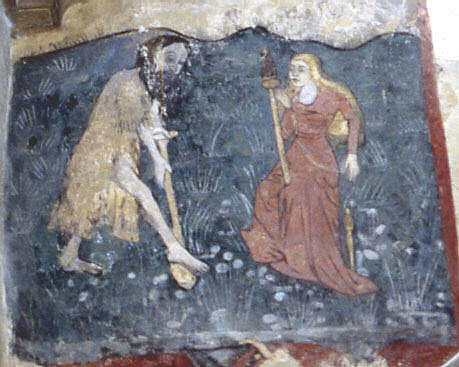Broughton, Cambridgeshire (†Ely) C.15
Expulsion from Paradise

In reality the two paintings are arranged vertically, with the Expulsion above and the Delving and Spinning below. They are on the south wall of the nave just before it meets the chancel arch wall where the Doom is painted, thus making the point the painter wanted to make, i.e. that the Fall brought death into the world and made the Doom of all flesh inescapable. The paintings were cleaned, stabilised and conserved along with the Doom in 1988, but there have probably been earlier restorations (the paintings were found in 1892).
The Expulsion itself is badly damaged, perhaps by water ingress, and the upper part of it has gone, but the lower bodies and legs of Adam and Eve express their shame eloquently, for all that. Near the centre is the trunk of the fatal Tree, and beyond it at the extreme left an angel, driving the pair out of the Garden. The treatment of this latter is the most interesting feature of the painting – Eden is shown as a walled garden, possibly a simple square, possibly with some more complex shape implied. This was common enough in the art of Continental Europe, and perhaps many scenes of the Expulsion on English church walls had this detail once – there are just not enough of them left to be certain, although the recently added painting at Bledlow seems to show part of a wall with an arched entrance.

The second scene (photo, left) showing Adam and Eve now afflicted by the curse of Labour, as decreed in Genesis 3:19, is very seldom found. The heavily-bearded Adam, possibly still dressed in the same ‘coat of skin’ that God clothed him in, has to drive his spade into the ground, which is littered with stones. Beside him Eve, with a red robe and her long yellow hair loose, spins with a distaff.
I do not know when the equality-asserting rhyme ‘When Adam delved and Eve span/Who was then a gentleman?’, usually referred to in connection with John Ball and Wat Tyler’s rebellion originated, but it was probably known well before the Peasants’ Revolt of 1381. Richard Rolle of Hampole had a variant of it, and Brewer quotes a French version featuring Queen Berthe, wife of King Pepin I.¹
¹ ‘Au temps passé, Berthe filait’ [Dictionary of Phrase & Fable (entry for ‘Adam’)]
† in page heading = Diocese